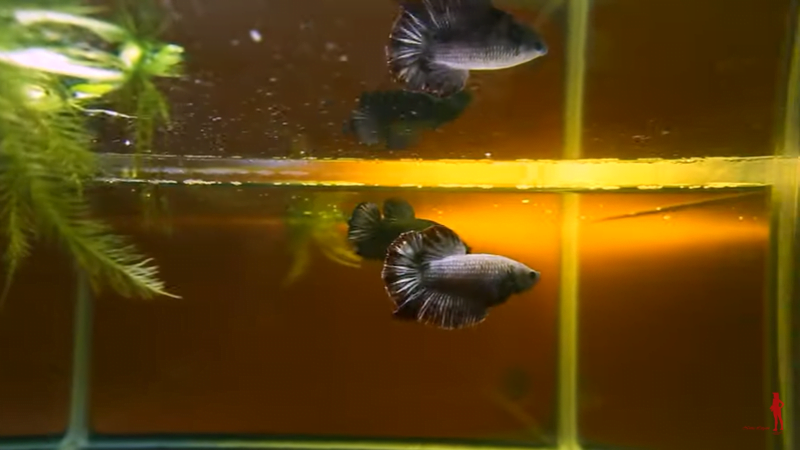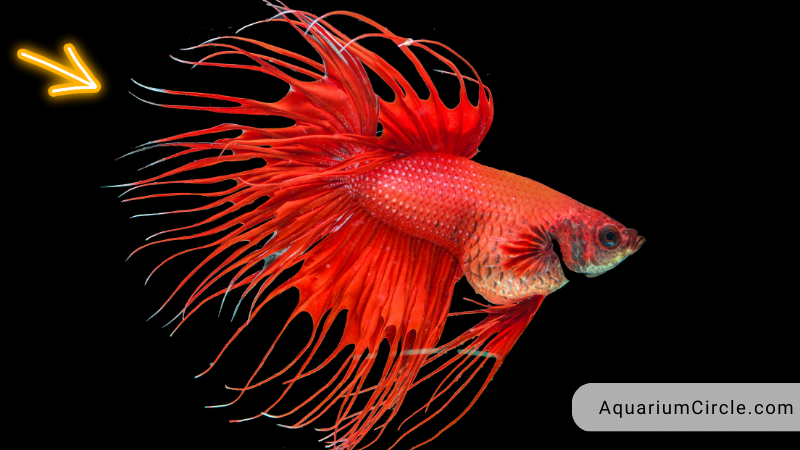Male betta fish frequently flare their fins in this way. These fish will flare their gills and fins in an aggressive show if they sense a threat or another male betta fish invading their area. It’s crucial to comprehend the causes of this behavior and how it could affect the fish’s health and well-being, even though it can be entertaining to watch. We will examine betta fish flaring in this post, including its causes, frequency, and possible effects on your pet fish.
What Is Betta Fish Flaring?
The act of the betta puffing up his gill flaps, which makes him appear much larger, is referred to as flares. If there are additional Betta fish in the tank or if male and female Betta fish share a tank, you might observe this behavior. However, it could happen even if your Betta’s fish tank isn’t shared with any other fish.
Male betta fish will flare their gills and fins in an aggressive display known as “betta fish flaring.” The fish most frequently exhibits this behavior when they sense a threat or believe that another male betta fish is invading their area. The betta fish’s gills open up, and their fins spread out as they flare, giving them a bigger, more menacing appearance. It’s interesting to see flare-ups, but it’s crucial to recognize the potential consequences for the fish’s health and welfare.
Why Do Betta Fish Flare?
As we mentioned, betta flares when some reasons happen. In this part, there are some significant reasons that you should know.
- Territorial instinct: Because they are fighting fish, bettas don’t appreciate visits from other fish in their territory. When confronted with an intrusion into its domain, a Betta fish(Siamese fighting fish) may flare its gills to make itself appear threatening. In the worst-case scenario, it acts as a type of intimidation to get the intruding fish to back off before things get physical.
- Mate and breeding: The male and female Bettas flare their gills at each other if they are kept in the same tank with a Betta of the opposite sex. You can be certain that the two fish are flirting with spawning once you spot a bubble nest on the water’s surface.
- New arriver: A new betta fish flare their gills when they become confused, or you first put it in a new tank because of its unfamiliar surroundings. As a result, you might observe that it continuously flares its gills in reaction to novel stimuli. Despite the fact that this is perfectly normal behavior, it isn’t good for your betta and could compromise your immune system.
- Watch your behavior: When you spend too much time around the tank in the beginning, you can see your betta may do flaring behavior. To put it another way, your new pet doesn’t see you as its owner or a kind creature who will ultimately give it food and keep it healthy. Your betta sees you as a powerful predator and a danger that needs to be eliminated. As little as possible should be done to disturb the fish when cleaning the tank.
- Their own personality: Unbelievably, a betta fish’s personality can occasionally affect how often it flares. Some fish are just inherently more agitated than others, and they may become agitated when they see their owners. Some fish flare too much.
- Flare at his reflection: The betta will assume a defensive stance when it recognizes itself since it believes there are two guys in the tank. Betta fish may flare if there are too many tank reflections, so you’ll need to take action.
- Boredom: Because they are clever fish, bettas can get bored if they don’t engage with their owners. You can purchase betta tank accessories that will keep your fish entertained.
What Are The Benefits Of Betta Fish Flaring?

As we have repeatedly stated, when Betta fish flare, they get significantly bigger and more menacing. Bettas also flare in the wild to impress prospective partners. Bettas are more likely to attract a mate if their flare is larger and more dramatic. Bettas employ flare similarly while they are in captivity. Betta fish need to expend part of their energy because they are such active fish. They do this, among other things, by flaring their fins and gills.
It’s a good indication that your Betta is healthy and has lots of energy to spare if you see them flare and then observe them swimming around vigorously following.
How To Avoid Betta Fish Flaring?
Notice your betta to determine what is causing your betta to flare if you want them to stop flaring. If you are aware of the source, you can take action to lessen the stress on the betta. To further aid in their relaxation, you might try giving their fins a gentle stroke.
Change the light
You might want to modify the lighting in the space to prevent reflections from occurring inside the tank. Try transferring the tank to a different location if doing that isn’t practicable. Alternatively, you might wish to change the lighting in the aquarium.
Cover up outside the tank
If you are unable to change the illumination in your betta tank, you might want to try covering the sides of the tank while leaving the front viewing window unobstructed. Employ neutral or light-colored craft paper or adhesive aquarium-specific paper that you can get from your neighborhood fish store. Anything with a lot of colors should be avoided because it could strain your betta’s eyes.
Another option that works well and may be simpler to mold to fit the tank sides is a piece of fabric. A piece of glass or acrylic can also be placed in front of the tank housing the Betta. This will obstruct their view of you and should lessen their tendency to flare at you.

Let your betta fish alone.
Removing the other fish from the tank may be a good option if your Betta is acting aggressively toward them. Even if they are of the same species, bettas are aggressive toward other fish and have a strong sense of territoriality.
So, it is probably preferable to remove the other fish from your Betta’s tank and give them their own tank if they are constantly flaring at the other fish in it.
Provide enough space
Bettas like to have lots of hiding spots, so if there aren’t enough of them in their tank, it can stress them out and make them act out. To give them extra places to hide, try adding some plants, pebbles, or other decorations to their tank. They will feel safer and more at ease as a result, and it might even help them flare up less frequently. As was already noted, bettas are territorial fish.
Also, they are accustomed to swimming long distances in the wild. So, if their tank is too tiny, it may put them under a lot of stress and result in a flare. The tank for your Betta needs to be at least five gallons in size.
Release negative energy
Betta fish need to expend part of their energy because they are such active fish. They do this, among other things, by flaring their fins and gills. It’s a good indication that your Betta is healthy and has lots of energy to spare if you see them flare and then observe them swimming around vigorously following.
Do Female Betta Fish Flare?
Flaring is usually seen at male bettas. The gills and fins of female Betta fish can and often do flare. They normally don’t flare as frequently or strongly as male Betta fish do, though.
The fact that female Bettas are typically less aggressive than their male counterparts contributes to this. A female Betta that is less aggressive might not feel as inclined to flare because a Betta only flares when it feels threatened or challenged. Having a female Betta with a male Betta may cause her to flare up more frequently than a female Betta by herself. This is because if the male Betta approaches, she can feel intimidated and flare her gills and fins to make a statement and keep him away.
Make sure you give her lots of shelter and hiding places in the tank to retreat to if she feels threatened in order to keep her secure and largely stress-free.
FAQs
Are they flirting?
Yes, maybe. If the behavior gets too rowdy and there’s a possibility of damage, keep an eye on the fish and be ready to separate them.
Why do they become aggressive?
Suppose the rival is of the same type or exhibits aggression at a comparable level. So, unless there is lots of space to share, it is not a good idea to have two or more male bettas in the same fish tank.
Do all betta fish flare?
The majority of Betta fish do occasionally flare their fins and gills. There are certain Bettas who don’t flare up very frequently, though. Some Bettas don’t flare for a variety of causes. That might be because they are less agitated and prone to panic attacks than other Bettas.
References:
- Siamese Fighting Fish – https://www.theaquariumwiki.com/wiki/Betta_splendens
- Betta fish flaring image – https://commons.wikimedia.org/wiki/File:Siamese_fighting_fish_flaring_its_gills..jpg

Annette M. Chaney is an experienced marine biologist with over 20 years of experience as an aquarist and fishkeeper. She started her first aquarium at a young age, filling it with frogs and goldfish obtained from the ten-cent pet store.
Annette grew up caring for and breeding African Cichlids, which led to a hobby in high school that doubled as a profitable means. Attending Reed College gave her time to solidify herself as an accomplished aquarium caretaker with an eye for sales. After that, from 2009 – 2013, she studied at Roger Williams University – one of the most prestigious universities for Aquaculture and Aquarium in USA. She is the founder of AquariumCircle since 2010.
